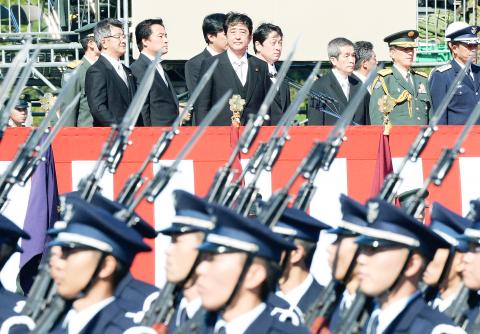Japanese Prime Minister Shinzo Abe told Japanese troops yesterday that Japan would not tolerate the use of force to change the region’s “status quo,” comments likely to rile Beijing, which is locked in a long and bitter territorial dispute with Tokyo.
“Use of force for changing the status quo” is an expression often used by Japanese politicians and security experts to indirectly refer to what they see as China’s aggressive maritime expansion in the East China Sea and the South China Sea.
Abe’s comments are the second in as many days in which he has effectively said Japan is ready to be more assertive toward China.

Photo: AFP
They came as Chinese military aircraft flew near Japan for a third day in a row, prompting Tokyo to scramble fighter jets each time.
Abe is seen as a hawkish nationalist who wishes to revise a post-war pacifist constitution drafted by the US and strengthen Japan’s defense posture.
His comment yesterday, made at an annual troops review, comes after the Chinese Ministry of Defense warned Japan not to underestimate China’s resolve to take whatever measures necessary to protect itself.
“Development of weapons of mass destruction and ballistic missiles by North Korea. Provocation against our sovereignty. The security environment surrounding Japan is getting tougher,” Abe told the military review, which consisted of about 3,900 troops, 240 vehicles and 50 aircraft.
“In order to show our firm national intention that changing the status quo by force will not be tolerated, we need to carry out various activities, such as surveillance and information gathering,” he said.
In the latest sign of tensions between the region’s two heavyweights, Japan yesterday scrambled fighter jets after two Chinese bombers and two airborne early warning planes flew near Japan’s southern islands into the Pacific and then back into the East China Sea. No violation of Japanese airspace took place.
The same formation of Chinese aircraft made similar flights on Friday and Saturday.

A magnitude 7.0 earthquake struck off Yilan at 11:05pm yesterday, the Central Weather Administration (CWA) said. The epicenter was located at sea, about 32.3km east of Yilan County Hall, at a depth of 72.8km, CWA data showed There were no immediate reports of damage. The intensity of the quake, which gauges the actual effect of a seismic event, measured 4 in Yilan County area on Taiwan’s seven-tier intensity scale, the data showed. It measured 4 in other parts of eastern, northern and central Taiwan as well as Tainan, and 3 in Kaohsiung and Pingtung County, and 2 in Lienchiang and Penghu counties and 1

FOREIGN INTERFERENCE: Beijing would likely intensify public opinion warfare in next year’s local elections to prevent Lai from getting re-elected, the ‘Yomiuri Shimbun’ said Internal documents from a Chinese artificial intelligence (AI) company indicated that China has been using the technology to intervene in foreign elections, including propaganda targeting Taiwan’s local elections next year and presidential elections in 2028, a Japanese newspaper reported yesterday. The Institute of National Security of Vanderbilt University obtained nearly 400 pages of documents from GoLaxy, a company with ties to the Chinese government, and found evidence that it had apparently deployed sophisticated, AI-driven propaganda campaigns in Hong Kong and Taiwan to shape public opinion, the Yomiuri Shimbun reported. GoLaxy provides insights, situation analysis and public opinion-shaping technology by conducting network surveillance

‘POLITICAL GAME’: DPP lawmakers said the motion would not meet the legislative threshold needed, and accused the KMT and the TPP of trivializing the Constitution The Legislative Yuan yesterday approved a motion to initiate impeachment proceedings against President William Lai (賴清德), saying he had undermined Taiwan’s constitutional order and democracy. The motion was approved 61-50 by lawmakers from the main opposition Chinese Nationalist Party (KMT) and the smaller Taiwan People’s Party (TPP), who together hold a legislative majority. Under the motion, a roll call vote for impeachment would be held on May 19 next year, after various hearings are held and Lai is given the chance to defend himself. The move came after Lai on Monday last week did not promulgate an amendment passed by the legislature that

AFTERMATH: The Taipei City Government said it received 39 minor incident reports including gas leaks, water leaks and outages, and a damaged traffic signal A magnitude 7.0 earthquake struck off Taiwan’s northeastern coast late on Saturday, producing only two major aftershocks as of yesterday noon, the Central Weather Administration (CWA) said. The limited aftershocks contrast with last year’s major earthquake in Hualien County, as Saturday’s earthquake occurred at a greater depth in a subduction zone. Saturday’s earthquake struck at 11:05pm, with its hypocenter about 32.3km east of Yilan County Hall, at a depth of 72.8km. Shaking was felt in 17 administrative regions north of Tainan and in eastern Taiwan, reaching intensity level 4 on Taiwan’s seven-tier seismic scale, the CWA said. In Hualien, the